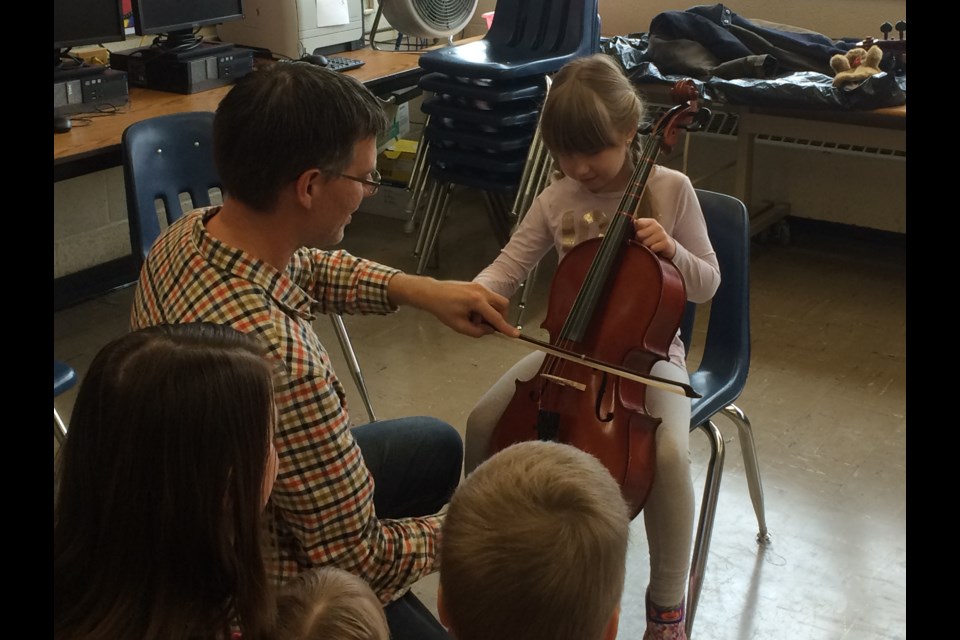Studies have shown that the first six years of a child’s life are critical for their physical and mental development.
The 13th annual Learning Together event encouraged children and their caregivers to share in, and enjoy a number of wide-ranging activities, together.
The day encouraged caregivers and children to learn together by talking, reading, singing and playing every day.
Over 50 community partners took over the classrooms and hallways of Chippewa Intermediate and Secondary School Saturday, providing opportunities for hands-on learning and exploration.
Children were invited to dabble in activities relating to different interests including arts or health, physical activity, science and robotics, messy baby play, as well as the planetarium from Science North. A building program encouraged youngsters to use materials found in nature. Children were also able to freely express themselves through music and dance.
“The takeaway is that parents need to be very engaged in their child’s early learning, because early learning, especially in the areas of literacy and numeracy, those foundations need to be laid in the first six years of life. With that, they go on to a successful transition to school,” explained Karen Cobb, co-chair of the Learning Together event.
“Once they enjoy early success at school, the research tells us they continue to enjoy that all the way through their education and then on to whatever they choose as adults living in the community.”
The activities were concentrated on children from birth, up to seven and eight years of age.
The school was alive with the sound of children’s laughter and boisterous play.
“We want to be able to appeal to every child’s interest, because one of the messages too, is follow your children’s interests. So if they have an interest in music, go for it. If they have an interest in robotics, then follow that too,” said Cobb.
The children were fully engaged in everything going on around them.
“Children really love hands-on, so all of the presenters here provided that opportunity. They all know what children in the early years need,” said Cobb.
“Obviously they need their parent engaged with them, but with the resources to teach them. The parents learned about the resources available in this community they maybe didn’t know were there, so hopefully, they’ll go forward and use those in the future as well.”
As manager of the student nutrition program through Community Living North Bay, Viviane Degagne shared with caregivers, ways to make a quick and nutritious breakfast.
“Our activity is making breakfast parfaits. It is an opportunity to show parents and children how easy it is to make some overnight oats, add some yogurt and berries to it, with a little bit of granola, and your child is ready to start their day with a full belly and something that is healthy,” said Degagne.
“A forum like this provides awareness to parents that student nutrition is available in all of our schools. We help to fund breakfast programs in the school, so it helps provide that awareness. And also to show parents how easy it is to provide something for their children that is healthy and really simple, and quick.”
Sophie Leblanc was busy trying to keep up with her little nephew Gage. He was quite taken by the violin he was given to try.
“All this interaction is good for him because it is helping to develop his mind. Both of his parents are very musical, they both play guitar and piano, so I think it helps develops a knack for music too.”
Seven-year-old Elizabeth McMartin tried her hand at playing the cello.
“It is cool. I like that I can sit down and play. I like that it is a deep sound, and I like that I get to hold the bow.”
Calvin Cheng is concertmaster of the North Bay Symphony Orchestra, and a violin teacher. He says some parents expressed interest in potentially starting their children in lessons.
“I’m here to hopefully get the children interested in music, and perhaps have an interest in taking violin lessons or cello lessons,” said Cheng.
“I would say around five or six years of age is a good time to start with lessons. They can focus a little bit better than younger children, they listen better and have a better attention span.”
In another music room across the hall, three-year-old Olliville Neuve has his pick of the table to try any number of musical instruments.
“I enjoy that he is getting to try different instruments. He just played the violin in the other room, and I know that children enjoy music, so it is a nice opportunity to see them try out different instruments,” said mom Valerie.
Melinda Shank-Miles of Long and McQuade Musical Instruments suggests making music part of a child’s everyday routine.
“Young children, even babies, and toddlers have this innate sense of rhythm and melody. Even a little baby before they can talk, will bounce and dance to music. So, it is good to expose them to all different types of music and musical instruments at a very young age, and then they can grow into that as part of their routine, part of their learning experience.”
Talulla Hirvilammi-Smith sits outdoors on a large sheet, creating art by gluing items found in nature, such as twigs, leaves, and rocks, onto paper.
“We are doing a provocation project, so we have outdoor materials for children to create whatever their minds desire. These projects are designed to promote creativity and imagination, although using outdoor products,” explained second-year Canadore College Early Childhood Education student Tessa Grant.
Learning Together rotates through the four school boards. Next year’s event will be held at a different location.



